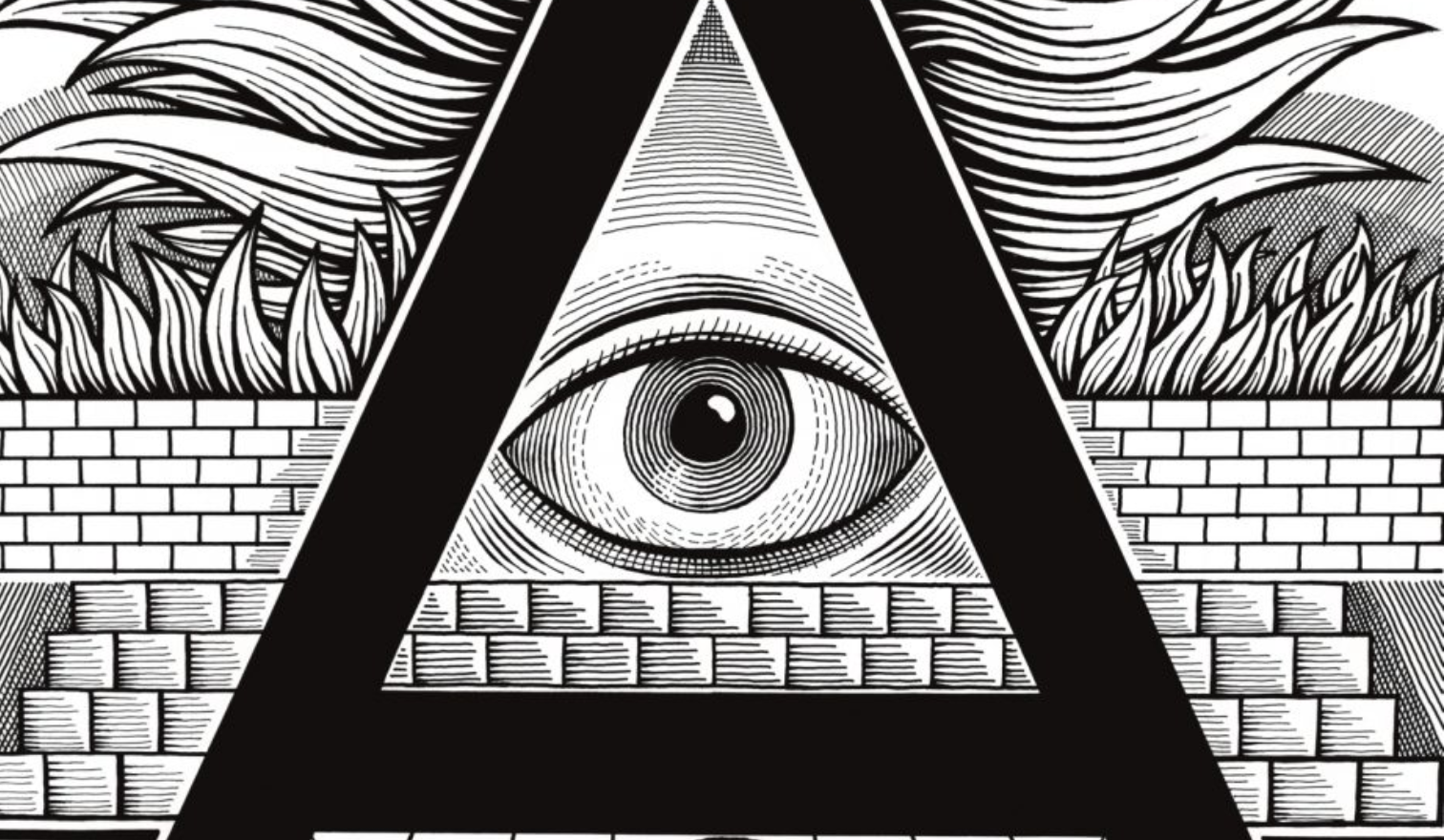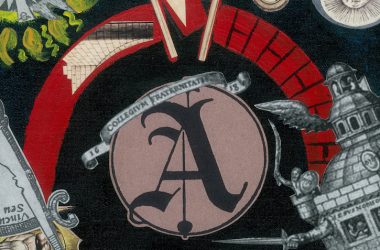Erica Lagalisse interviews Spartacus Tonans, Supreme Magus of the Kitchen Garden 007˚, author of “Occult Features of Anarchism” (PM Press, 2019)
So, is the Coronavirus part of a great global conspiracy?
A conspiracy called capitalism. The virus doesn’t need to be manufactured by governments to serve elite interests. States intervene in pandemics not to mitigate human suffering but to consolidate their power, so it is no coincidence that governments are taking the COVID-19 pandemic as an opportunity to amplify police power, outlaw protest, and remind you to fear your neighbor. Of course, we are encouraged to live in solitary isolation, scrolling through the apocalypse, breaking only to play digital war games or watch crap porn while making Jeff Bezos rich buying shit from Amazon; however, it is also true that physical distancing will slow down the rate of infection and allow more people to survive. In regard to the politics of this new “Crown Virus”, like so many other Conspiracies of Kings, both things are true. This is the line I walk in my book.
Occult Features of Anarchism is a feminist take on anarchism, a critique of posh lefties, and the “true history of the Illuminati” all in one. How would you sum it up?
It’s a historical essay that shows how what we call “the Left” developed in complement with occult philosophy and New Age spirituality. In the hands of power, “magic” is brought to support authoritarian projects – politicians and fascists know this well. Yet if it were not for early revolutionaries mixing what they understood to be “ancient magical wisdom” with new materialist science and social discontent in new ways, we may not have seen the rise of Left revolutionary movements: Occult knowledge is adaptable to a variety of projects – pyramid schemes, levelling schemes, and pyramid schemes for levelling – we’d best not ignore it.
Can you tell us a bit more about your approach to “conspiracy theory”?
The phrase “conspiracy theorist” is code for low-class. Otherwise, university lecturers that discuss the covert operations of the CIA would also be called “conspiracy theorists”. This is worth noticing, because we need coalition-building now more than ever, and just as lefties should not write off hippie New Agers, neither should they assume that the “conspiracy theorist” must be a fascist. Of course, precisely because things can veer in this direction, it’s even more important that lefties come up with an effective way of engaging “conspiracy theorists”. In the process, we might consider the extent to which “conspiracy theory” involves valid social commentary. Some “conspiracy theories” are bonkers or blame Jews for global poverty, in which case, arguing with a fan is an important anti-racist intervention; but sometimes calling someone a “conspiracy theorist” is just class prejudice disguised by another name. Academics make their knowledge inaccessible in a variety of ways, which means that the best way people have to investigate why the world seems stacked against them is to ask the internet, which means people are going to find a lot of seductive “conspiracy theories”. I don’t think we should make fun of anyone for that. Also, the ruling class really does seem to be trying to kill us – it should be considered a fair guess.
Can you elaborate on the idea of “conspiracy theory” as critical social commentary?
Many YouTube videos tell stories of the Knights Templar finding secret treasure under Solomon’s temple in Jerusalem during the Crusades, with Illuminati-controlled Freemasons later using it to collapse the great world religions into one big banking tradition in the name of Lucifer. Yes, this story sounds different than Polanyi’s in The Great Transformation (1944), which also explains how global elites forsake traditional allegiances in the project of modern capitalist banking – social scientists will always prefer to highlight “systemic forces” rather than the whimsy of a few knights. The pop culture version is too allegorical for academic tastes but, given that many “conspiracy” buffs think banks are so bad they must be Satanic, it should be easy to see how some could become interested in anti-capitalism instead of fascism. (For academic readers, my advice in a nutshell is: replace Foucault with Bourdieu.)
Ok, getting to the good stuff: who are the Illuminati?
Once upon a time, there was the French Revolution, and all the Kings and Queens of Europe were very upset, so they formed the Holy Alliance. Known as the “Conspiracy of Kings”, it was they who pledged to cooperate in international publication bans, transnational surveillance, and deportation of militants by any sovereign threatened by “revolutionary inroads”. The Illuminati, on the other hand, started before the French revolution, and considered state and church corrupt. They criticized landlords and private property. Started by a Bavarian professor in 1776, it grew from five students to 54 members 3 years later, including people like Mozart. Members shared provocative Enlightenment ideas that are now commonplace, such as the value of science, while contemplating how to make society more egalitarian. In 1783 a member tattled to his employer and a repressive campaign began. This is the first time we hear claims made that all Freemasons are “under control” of the Illuminati – but it was the government talking then.
How has the story gotten switched around?
Partly because propagandists in the early 20th century sought to vilify Jewish people by associating them with banking and Freemasonry. There are also people in power now who gain from us ignoring capitalism and the World Trade Organization by focusing on Jews or lizardmen. The classical Art of Memory, revamped as magical practice in the Renaissance, was further re-invented within psychoanalysis and modern psychology, and is now used in the media to (mis)guide us. In fact, both mainstream news outlets as well as bros pumping out “conspiracy theory” videos employ this long-developing art of using sensational images to inspire certain mental associations and manipulate memory. We really are being fucked over by magical mind control, just not in the way some “conspiracy theorists” suggest. This is where I would suggest those suspicious of COVID-19 place their attention, by the way – the virus is authentic, but so is the dark art of Public Relations.
You explain that you write about the cosmology of anarchism to challenge atheist anarchists who look down on religious or spiritual people despite claiming to be anticolonial at every turn. But there’s got to be another story: what’s the scoop?
Well, there’s the fact that I love math. Are mathematical forms the underlying structure of the universe? Or is mathematics a language applied to an ineffable reality that always exceeds representation? It’s no coincidence that I study the history of sacred geometry in this first book, and study how activists fuck up “intersectionality” with algebra in my upcoming one – mathematics is very seductive, and not just for me. Why does symmetry impress us? To what extent is statistical thinking cultural or cognitive? Why do people love YouTube videos about the “Golden Mean” so much? Why does the Art of Memory work? Is Aby Warburg’s theory of images a form of Lamarckian evolutionism? How many triangles can I find in Hegelian philosophy? This kinda stuff is my jam. I used to draw geometrical diagrams instead of writing outlines for my term papers – I lost marks for it and was told it’s because I have “synesthesia”, some kind of mental illness. Wizard sounds better, don’t you think? Just like splitting yourself into pen names for an interview sounds better than you talking to yourself.
Erica Lagalisse is a writer, anthropologist, and postdoctoral fellow at the London School of Economics. They are the author of Occult Features of Anarchism.
Illustration by Clifford Harper

If you enjoyed reading this article online, why not pick up a print copy? Your purchase will help us continue to produce anti-profit publishing – including distributing solidarity DOPE to prisoners and homeless people.
Erica Lagalisse is an anthropologist and writer, a postdoctoral research fellow at the London School of Economics (LSE), editor of Solidarity and Care During the Covid-19 Pandemic at The Sociological Review, and author of Occult Features of Anarchism – With Attention to the Conspiracy of Kings and the Conspiracy of the Peoples (2019). She can be found on Twitter at @ELagalisse.




